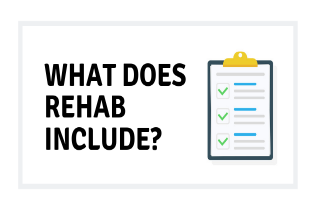Information on inpatient drug rehab centers
Drug addiction is a chronic disorder which can be treated! But often when we start on the road to recovery, we’re not sure what lies ahead. Here, we review the main stages of treatment during drug rehab. The goal of rehab? To stop uncontrolled drug use and learn how to live drug free life.
Please read on for more information about what to expect during a stay in inpatient drug rehab centers and its associated costs. Then, we invite your questions and comments about rehab at the end. In fact, we love hearing from our readers and try to respond to all questions with a personal and prompt reply.
Inpatient drug rehab protocol
The first step in rehab is assessment. To being your stay in rehab, you’ll first receive a combination of physical exams and interviews to determine the nature of your individual problem with drugs. You may be asked to provide blood or urine samples to determine level of drug dependence. Interviews can last for an hour, or two, and will give rehab staff a good idea of where you’re coming from and what kinds of therapies can help.
Then, if needed, you proceed to detoxification. Medical detox includes supervision, use of medicines, and emotional support in order to helps patients to prevent relapse and ease withdrawal symptoms.
Next, treatment therapies are provided according to your individual treatment plan. The therapeutic process of quality inpatient rehab centers should include a combination of psychological/behavioral therapy and medications. Health services and family-based support systems should also be included. All these aspects are important for building a successful, drug-free life.
Inpatient drug rehab stages
The stages of the addiction treatment depend on a client’s individual needs, the effectiveness of therapy, and optimal administration. But overall, these are the main stages of any drug rehab center:
1. Early treatment.
As you begin treatment, know that people can be easily emotionally broken but NOT WILLING TO QUIT. This is because they feel ambivalence about the decision to stop using. For this reason, the main focus of this stage is managing a person’s cravings and preventing relapse. After medical detox, you will then enter a structured daily program of group and individual therapy, with educational sessions and a routine of regular meals and exercise.
The therapeutic goal during this period will focus on creating a secure and stable therapy group that works on principles of equality, support and cohesion between the members. Getting your “buy-in” takes up the most of the therapeutic time in this early stage, so facing and solving family problems is left for a later stage. However, if you’re willing and interested in getting better, this phase of treatment can be more effective.
2. Middle stage of treatment.
When you’re ready, you’ll be asked to directly face how addiction causes problems in your life. You’ll be encouraged to establish new healthy habits that will strengthen coping strategies. You’ll look into the “real” problem: the way that you deal with life, your thoughts, feelings, and behaviors.
Mostly, rehabs pay attention to the emotional problems and underlying psychological issues which compel drug use during this period. They teach clients how to deal with the relationships they have with other people and to confront their own behavior. Revealing the systemic way things work can help people identify patterns and start to make lasting change.
3. Late stage treatment.
After you spend time examining your inner your, rehabs then spend less time on substance abuse per se and turns toward treatment gains to be maintained and risks that remain. During this stage, you’ll be asked to focus on the issues of living, resolving guilt, reducing shame, and adopting a more introspective, relational view of yourself. You’ll set up an aftercare plan, which includes a relapse prevention plan. You’ll prepare yourself for life “outside” the inpatient center and begin to make the transition to sober housing, support group attendance, and ongoing outpatient therapy.
Inpatient drug rehab costs
How much does inpatient drug rehab cost varies depending on the treatment centers and services they offer. A day in residential treatment costs around $700 per day. The average cost of inpatient drug rehab generally ranges from $10-20K per treatment episode of 28-30 day stay. These amounts include accommodations as well as psychological, pharmacological, and educational modalities.
Low cost inpatient drug rehab
If you are looking for a low cost drug rehab, there are several ways to identify them. Here are some tips:
- Review your medical health insurance benefits and see what it covers. If it covers part of your treatment, your out of pocket costs will be reduced.
- Many rehab facilities accept Medicare. Check with the Medicare website to see if you qualify for benefits.
- Some government programs offer free or low cost inpatient treatment programs. Contact your local or state department of health and social services to assist you in looking for treatment.
- Consider attending a sliding scale inpatient treatment programs. You can find treatment facilities that base their costs on sliding scale fees by targeting a list of low cost treatment centers on the Substance Abuse and Mental Health Administration’s (SAMHSA) treatment locator website. These fees are then based on your ability of payment or income.
Inpatient drug rehab questions
Do you still have questions about inpatient drug rehab? Are you interested in learning more about the costs of inpatient rehab? Please ask us your questions below. We’ll do our best to respond to you and your needs. We love to hear from our readers!









Related Posts